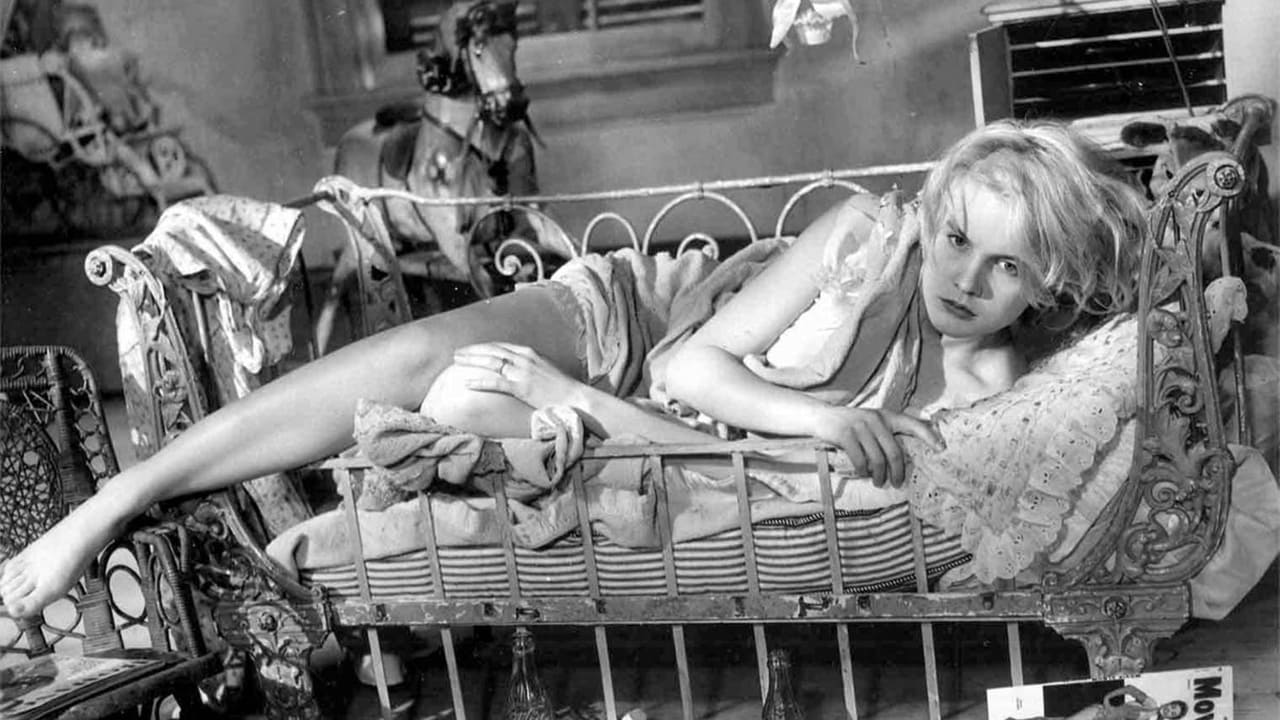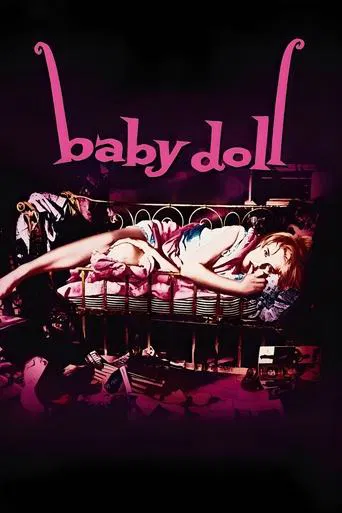

What a waste of my time!!!
... View MoreThis is a small, humorous movie in some ways, but it has a huge heart. What a nice experience.
... View MoreThis movie tries so hard to be funny, yet it falls flat every time. Just another example of recycled ideas repackaged with women in an attempt to appeal to a certain audience.
... View MoreThis is a dark and sometimes deeply uncomfortable drama
... View MoreThis is what Karl Marx said about history repeating itself in his 1852 essay, "The Eighteenth Brumaire of Louis Bonaparte." "Brumaire" is the second month of the French Republican calendar and refers to fog. I think the same concept can be applied to Baby Doll in relation to the 1953 movie that Tennessee Williams also wrote and Elia Kazan also directed, A Streetcar Named Desire. In Streetcar, we grow to identify with and even love the characters played by Vivian Leigh and Marlon Brando. In Baby Doll we are more likely to hold the protagonists in contempt.This does not mean that Baby Doll is badly written, directed, or acted. It is just too much. Everything is extreme and exaggerated. It's hard to take seriously and sometimes appears as grotesque comedy. Yet Williams was intimately familiar with the American South. Maybe farce was a valid way to see it in 1955.
... View MoreTwo years back middle-aged cotton gin owner Archie Lee Meighan (Karl Mulden), obviously none too attractive, entered into marriage with Baby Doll Meighan (Carroll Baker), a girl barely 18 and convinced to accept the proposal at her father's deathbed. Immersed into her name Baby Doll sleeps in a child's crib and states overwhelmingly how unready she is to consummate wedlock, hence entering into an agreement with the elder Archie Lee - she will be ready on her 20 birthday, but only if she is offered the luxuries of the world: life in a mansion and fulfilment of all material needs. However two days before the big game Archie Lee is on the verge of bankruptcy, as his competition, an uncompromising Sicilian immigrant Silva Vacarro (Eli Wallach) has monopolised both cotton production and the gin factory. Obsessed with his deflowering his wife Archie Lee commits arson. Silva is quick to point his finger as Silva and decides to instrumentally use Baby Doll for vengeful purposes...With Tennessee Williams and Elia Kazan (famed for family friendly film versions of controversial novels) "Baby Doll" seemed destined to achieve much at the box office. Although Oscar success was forthcoming the controversial sexual subtexts in the movie caused much furore amongst religious groups and even some drastic reviews in the "Time" or "Variety" demonizing the films confrontational story. Mainly due to the fact that "Baby Doll" was so ahead of its time in terms of context, the plot seems fresh, well defined and relatively up-to-date. Even after so many years Carroll Baker oozes sensuality, a naive vixen not fully aware of her delirious effect on men. Both Mulden and Wallach compliment the picture with equally forceful performances, making "Baby Doll" very much a timeless movie.The biggest issue however seems the overreach by Elia Kazan. The director deals with a contemporarily controversial subject matter with infidelity and promiscuity a theme inclined, rather than presented - Archie Lee does dastardly deeds just to get the nookie, Silva meanwhile uses his charm to bewilder the innocent Baby Doll, who in turn falls into her role of an innocent, but sexual female to entice both men. Therefore in order to lighten the load Kazan uses various moments of the movie to introduce ill-timed humour or counterintuitive slapstick moments, which derail tension between characters and cause a certain lack of reliability on a psychological level. The overall effect is a tired story with limited coherence in dire need of a severe makeover.There are also some dated elements, which albeit purposeful seem out of touch and a tad controversial for non-sexual reasons. This mainly concerns the portrayal of black community, often referred here are 'niggers' and serving a sole purpose as background props. Albeit probably not racist in essence (given Tennessee Williams stance on the matter) and an honest contextualisation of blacks who are treated as denigrated individuals, their diminished role in the movie can cause an uneasy tension. That said they play a key role as watchful observers of the shenanigans in the Meighan household, summarising the events with a meaningful laughter during the final act.Times past the steamy interaction between Baker and Wallach has nowhere near the effect as back in the days - sex now commercialised and mainstream. That said the tension stills lingers, forceful and forbidden, making it one of the main reason to watch the movie.
... View MoreWatching Baby Doll I have to ask just what the Almighty Legion Of Decency was so upset about back in 1956? There's no bad language and no sex scenes beyond what was per normal back in the day. I'm guessing that it was Tennessee Williams that brought about the scrutiny. He was breaking down a lot of taboos in those days and another writer with his name on the screenplay would not have received the attention. Of course they also didn't like The Moon Is Blue and this is far better.The source of Baby Doll is an expansion of a one act play Williams wrote for three part show All In One which had a short musical as well as short interpretive ballet. The play within the show was called 27 Bales Of Cotton and it starred Myron McCormick, Maureen Stapleton, and Felice Orlandi. All In One was not one of Tennessee's successes only running 47 performances during the 1955 season on Broadway.Those were the only three characters in the short play so Warner Brothers used some good sense in hiring Williams himself to expand his own work for the screen. Baby Doll has absolutely no trace of stage origins which you can't say for something like A Streetcar Named Desire, probably his best work or Cat On A Hot Tin Roof. The parts from Broadway were played in the film version by Karl Malden, Carroll Baker, and Eli Wallach in his screen debut.Malden is a local big shot in the fictional Tiger Tail County in Mississippi who has a cotton gin, but he's been losing business to brash newcomer Eli Wallach. That's around the time he's taken to himself a young trophy wife played by Carroll Baker, a sexy young vixen who is always referred to as Baby Doll. It was a marriage of convenience where Malden promised not to do the deed until until her 20th birthday which is coming up very shortly. It seems her father who was poor white trash wanted to know his daughter to be decently provided for. Malden's also taken over a rundown old mansion and is trying to fix it up. Carroll and a dotty old aunt played by Mildred Dunnock live there with Malden.Malden's been waiting a few years to get his itch scratched, Baker's not thrilled with the prospect of giving it up to Karl. But Wallach's cotton gin is forcing him to economic straights. That combination forces him to set a fire to Wallach's gin and ruin his competition. The authorities know full well Malden either did it himself or had the arson hired, but Wallach is the outsider and a Sicilian immigrant to boot. They politely look the other way. But Wallach has a plan all his own for revenge.One thing I have to say about Baby Doll, it's the only one of Tennessee Williams southern based works that I've seen where blacks are referred to. Here their position in white supremacist Mississippi is demonstrated fully. The mark of Malden's downfall is how the black employees laugh at him in the climax.Baby Doll was nominated for four Oscars in 1956, Best Adapted Screenplay for Tennessee Williams, Best black and white cinematography, Best Actress for Carroll Baker and Best Supporting Actress for Mildred Dunnock. As this was an adapted screenplay, Dunnock's role was not in the original work, but Williams infused the old lady with a certain amount of common sense if you carefully listen to her. Mildred lost to an actress playing a sexpot like Carroll Baker, the wild child Dorothy Malone for Written On The Wind.As for Baker she lost to Ingrid Bergman for Anastasia, but she got a role that she would forever be identified with. And being identified with a Tennessee Williams character is far from the worst thing to have. Though in her career she tried to downplay that even being cast as a saint in The Miracle.Baby Doll as it turned out was better on screen than in its original form on stage. It holds up very well, it is timeless as all of Tennessee Williams is. It's just not broadcast that often. But make sure to see it when it is.
... View More"Baby Doll", when it was released in 1956, was obviously going to be a very controversial film. While the country was in the lazy, comfortable days of the mid-1950's, along comes Elia Kazan with a story about a smoldering sexpot wife who is seduced by a Sicilian, who is a competitor of her husband. It is said that upon the film's release, many groups wanted the film pulled from theatres because it was so controversial. By 1956 standards, you can see why. The only problem is, that the movie is not very good.The acting for the most part is over the top. I think that is because the screenplay, by Tennessee Williams is too talkative when it doesn't need to be, has three basically unlikeable lead characters, and doesn't really have much of anything to say. The actors, all from Kazan's beloved Acting Studio do all that they can to try to infuse some meaning into the dialogue. Karl Malden especially gives an "over the top" performance."Baby Doll" takes place in the south, and yet there is no hint of any racial issues mentioned. The one great asset this film has going for it, is that it is filled with many local citizens as extras. Their is a great story in each of their faces, that would be more interesting than this movie.The film has a great many sound quality problems, as well, and a lot of scenes where you can see the actor is talking, but there is no sound to accompany the actions.4 out of 10
... View More